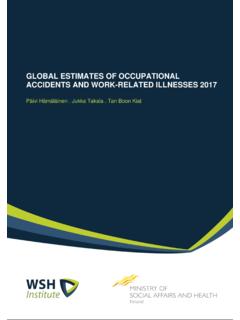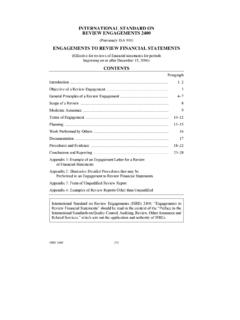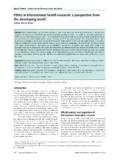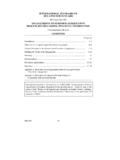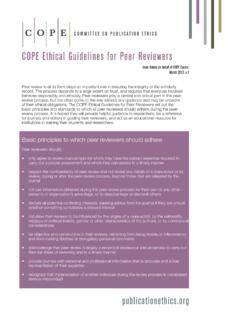Transcription of INTERNATIONAL CODE OF ETHICS FOR …
1 I INTERNATIONAL code OF ETHICS FOR OCCUPATIONAL HEALTH PROFESSIONALS II First printing: 1992 Second printing: 1994 Third printing: 1996 First updating: 2002 Second Printing: 2006 Third Printing: 2009 Fourth printing: 2012 Permission for translation and reproduction This document may be freely reproduced provided that the source is indicated. Translation is subject to the agreement of ICOH* and the translated version must include a copy of the code in either English or French. The part entitled Basic principles summarizes the principles on which the code of ETHICS for Occupational Health Professionals is based and could usefully be posted in occupational health services.
2 *ICOH: INTERNATIONAL Commission on Occupational Health Secretariat General Address: Sergio Iavicoli MD, PhD INAIL , ex ISPESL Italian Workers Compensation Authority Department of Occupational Medicine Via Fontana Candida 1 00040 Monteporzio Catone (Rome) Italy Tel: +39 06 94181506 Fax: +39 06 94181556 Email Address: INTERNATIONAL Commission on Occupational Health 2012 ICOH Commission Internationale de la Sant au Travail 2012 CIST III Acknowledgements This reprinted edition has been made in conjunction with the ICOH 2012 Congress in the view of the release of the new edition which is under development. The INTERNATIONAL Commission on Occupational Health (ICOH) is very pleased to publish this INTERNATIONAL code of ETHICS .
3 The history of the drawing up of this fundamental guide in everyday occupational health medicine practice dates back to 1987, when its preparation was first discussed by the ICOH Board in Sydney. In consideration of the ever-increasing demanding need of the changing worldwide work, my wish is that this valuable instrument may become more and more used within the scientific and practitioners community. This document is the outcome of hard work and the contribution of the entire ICOH Community, including all those who submitted comments and suggestions, giving valuable input. Of all, I would like to thank Past President Bengt Knave: this revised edition exists because he assigned a task group for the revision in triennium 2000-2002.
4 My deepest appreciation goes to the members of the task group Jean-Fran ois Caillard, chair, William Murray Coombs, Gustav Schaecke, and Peter Westerholm for their constant commitment and constructive cooperation. Special thanks go to the Board Members for finalising the document at the Board Meeting held in Rome in March 2002. In addition, I greatly acknowledge the contribution by Ms. Daniela Fano, Mr. Fabio Boccuni, Mr. Pierluca Dionisi, Mr. Carlo Petyx, Ms. Valeria Boccuni and Ms. Antonella Oliverio. Sergio Iavicoli, MD, PhD Secretary-General IV March 2, 2012 Foreword The INTERNATIONAL code of ETHICS for Occupational Health Professionals published by the INTERNATIONAL Commission on Occupational Health (ICOH) presents the ethical principles essential in occupational health.
5 The code is intended to guide all professionals who carry out occupational health activities and to set a generally valid reference level in their performance. We are pleased to reprint the current code of ETHICS on the occasion of the 30th INTERNATIONAL Congress on Occupational Health held in Cancun, Mexico from 18-23 March 2012 as a key event of ICOH. This INTERNATIONAL code of ETHICS was first published in 1992 in English and French with the approval of the Board of ICOH. The 1992 code of ETHICS set out basic principles and practical guidelines. In consideration of the changing environment where occupational health is practiced and of the need to provide guidance on particular aspects of the professional conduct, the code was revised in 2002.
6 The current code corresponds to this 2002 edition. The ICOH code of ETHICS is broadly accepted serving as a standard for evaluating professional conduct in occupational health. In some countries, the code is incorporated in the national law. In 2010, the United Nations Medical Directors Working Group agreed to advise that any UN organizational statements of ETHICS in occupational health matters should be guided by, and consistent with the ICOH code of ETHICS . It is encouraging that the ICOH code of ETHICS is widely referred to in occupational health and related fields. In its introduction, the code highlights three basic principles: serving the health and social well-being of workers; integrity and impartiality in professional conduct; and full professional independence.
7 An emphasis is placed on a proper preventive action at work based on the advisory roles of occupational health professionals. It is hoped that the code is acknowledged in a reassured manner as a standard for defining and evaluating professional conduct in occupational health. During the triennium 2009-2011, the review of the INTERNATIONAL code of ETHICS has been conducted involving many ICOH members. The review is aimed at enhancing the ethical awareness and updating the code with adding supplementary provisions reflecting recent developments. The review activities by the code Review Group were presented at the ICOH Midterm Meeting in Milan in early 2011. Subsequently, the initial review draft was distributed to the officers of ICOH Scientific Committees and National Secretaries for their comment.
8 Based on the feedback from many members, the review results were presented later in 2011. The results demonstrated the adequacy of retaining the current structure and the basic principles and the need to strengthen the provisions relating to workplace action, privacy of health data and conditions for execution of professional functions. It is now proposed to update the code , with minimal revisions, with a view to reinforcing the professional conduct in occupational health in diversifying work situations. Views and comments about updating the code are therefore highly welcome. The ICOH 2012 Congress is a valuable occasion to deliberate on the future directions of our professional functions.
9 We sincerely hope the renewed attention to the ICOH code of ETHICS at the Congress will serve as a new impetus for our joint appraisal of professional conduct in occupational health. Kazutaka Kogi President INTERNATIONAL Commission on Occupational Health (ICOH) V Preface 1. There are several reasons why an INTERNATIONAL code of ETHICS for Occupational Health Professionals, as distinct from codes of ETHICS for all medical practitioners, has been adopted by the INTERNATIONAL Commission on Occupational Health (ICOH). One is the increased recognition of the complex and sometimes competing responsibilities of occupational health and safety professionals towards the workers, the employers, the public, public health and labour authorities and other bodies such as social security and judicial authorities.
10 Another reason is the increasing number of occupational health and safety professionals as resulting from the compulsory or voluntary establishment of occupational health services. Yet another factor is the emerging development of a multidisciplinary approach in occupational health which implies an involvement in occupational health services of specialists who belong to various professions. 2. The INTERNATIONAL code of ETHICS for Occupational Health Professionals is relevant to many professional groups carrying out tasks and having responsibilities in enterprises as well as in the private and public sectors concerning safety, hygiene, health and the environment in relation to work.
